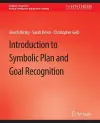
Introduction to Symbolic Plan and Goal Recognition
3 authors - Paperback
£44.99
Reuth Mirsky is a postdoctoral fellow at the Computer Science department in the University of Texas at Austin, under the mentorship of Prof. Peter Stone. Reuth received her Ph.D. from the Department of Software and Information Systems Engineering at Ben Gurion University, under the supervision of Prof. Kobi Gal. Her Ph.D. thesis was on plan recognition in exploratory environments. Reuth’s research focuses on improving existing AI with human-inspired design, and her algorithms have been applied in various tasks for education, clinical treatment, and finance. Reuth’s contributions were published by leading AI and HRI conferences and journals. Her longterm research vision is to enable better collaborations in mixed human-and-artificial agents settings.Sarah Keren is a postdoctoral fellow at Harvard University, where she is affiliated with the Center for Research on Computation and Society (CRCS). Her mentors are Prof. Barbara Grosz and Prof. David Parkes. Before coming to Harvard, Sarah completed her Ph.D. at the Faculty of Industrial Engineering and Management of the Technion–Israel Institute of Technology, where she was advised by Prof. Avigdor Gal and Dr. Erez Karpas. Sarah’s research focuses on manipulating and redesigning environments for optimizing their utility. In particular, her Ph.D. work established the task of Goal Recognition Design, where environments are manipulated to maximize the ability to recognize the goals of agents acting within them. Sarah’s work has appeared in three leading artificial intelligence conferences (AAAI, ICAPS, and IJCAI). She has received various excellence awards, including an honorable mention for best paper at ICAPS 2014 as well as the Eric and Wendy Schmidt Postdoctoral Award for Women in Mathematical and Computing Sciences.Christopher Geib is a Principal Researcher at SIFT LLC and an internationally recognized researcher in probabilistic plan recognition and planning. He received his Ph.D. in Computer Science from the University of Pennsylvania in 1995. Prior to joining SIFT, he had an extensive career both in academia as an Associate Professor at Drexel University and a Research Fellow at the University of Edinburgh, and in industry as a Principal Research Scientist at Honeywell. He has published more than 50 scholarly publications. His interests include probabilistic plan recognition and planning under uncertainty based on formal grammars and interaction between human and synthetic agents using actions and language. He has been the principal architect of multiple plan recognition systems over the last 20+ years.